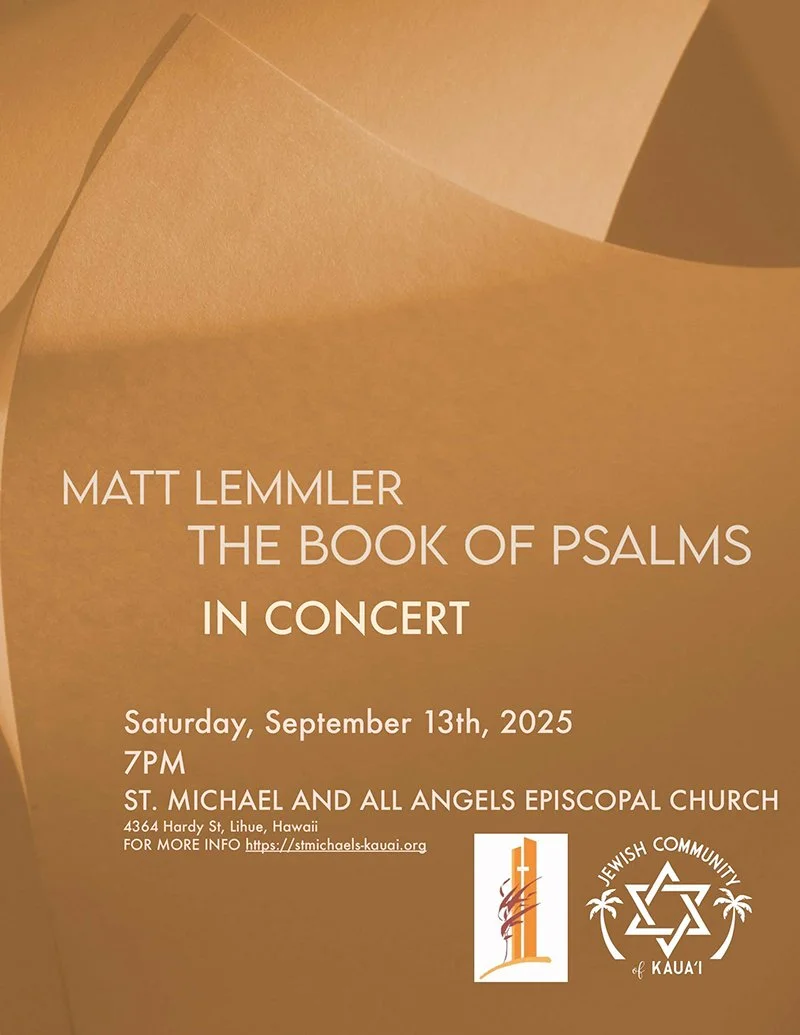Hanukkah Party
We are having a Hanukkah party on Sunday, Dec 14
from 5-8pm at St Michael’s Church
We are having a Hanukkah party on Sunday, Dec 14
from 5-8pm at St Michael’s Church

Please join us at 5:30pm on Friday, November 14th at St. Michael & All Angels Church for an uplifting musical service followed by a communal meal. We will even have Israeli dancing! We ask that you bring a main dish to share (no shellfish or pork, please).
Questions? Contact Lauren Miller by phone or text, 818-689-5235.
Hope to see you on the 14th!


Please join the Jewish Community of Kaua’i for our next Shabbat service!
Date: Saturday, August 16, 2025
Time: 10AM
Place: St. Michael’s, Lihue
Marty Kahn will lead the service, and we’ll have Kiddush and an Oneg following. We will have security services present for the comfort and safety of all.
We look forward to sharing Shabbat morning with our friends, family and Kaua'i community!
Please join JCK for an Erev Shabbat celebration
at Lydgate Park on Friday, July 18, 2025, 6-8:30pm.
6 - 6:30pm Arrivals & schmoozing
6:30 - 7:15pm Candle Lighting & Erev Shabbat service led by community members
7:15 - 8:30pm Potluck dinner, live music & more schmoozing
Please bring a main or side dish to share, and feel free to bring dessert in addition if you'd like. JCK will provide challah, wine, and grape juice. Please no shellfish or pork, and bring a serving utensil for your dish.
We will gather on the playground side of the park, in the smaller Pavilion near the new playground.
As we are all aware, life in the Jewish community has changed greatly in recent times. Given increasing security concerns to our global community, private security will be present at this event.
This event is sponsored by JCK but open to all of the island’s Jewish community and Jewish visitors. Please feel free to invite non-members to join the event!
RSVPs are encouraged if possible. Please text Lauren Miller at 818-689-5235.
Hope to see you on the 18th!
Please join Jewish Community of Kauai for our next Shabbat service!
Date: Saturday, June 14, 2025
Time: 10AM
Place: St. Michael’s, Lihue
Marty Kahn will lead the service, and we’ll have Kiddush and an Oneg following.
We look forward to sharing Shabbat with our friends, family and Kaua'i community.
Families with kids 5-10 years old are invited to a Shavuot hike on Sunday morning at 9:30am! Come celebrate the giving of the Torah with a kid-friendly hike, Jewish music, and a traditional Shavout treat - cheesecake!
RSVP to Lauren Miller at 818 689-5235. Call or text.
Location will be shared when you RSVP.
Chag sameach!
Please contact us at jewishcommunityofkauai18@gmail.com if you did not receive our letter so we can update your contact information.
Thank you!

Marty Kahn will lead the service, and we’ll have Kiddush and an Oneg following.
We look forward to sharing Shabbat with our friends, family and Kauai community.
Where: St. Michael and All Angels Episcopal Church, Hardy Street, Lihue. Map.
When: Saturday, May 17, 2025
Time: 10:00 am.
They Were There in Israel’s Darkest Hour – Now They Need Our Support.
On October 7th, 2023, Israel faced an unimaginable tragedy. As Hamas terrorists stormed homes, massacred families, and tore lives apart, Tomer Peretz, a renowned Israeli American artist, was visiting his homeland. Without hesitation, he joined a group of ZAKA volunteers in the sacred task of recovering the victims’ remains, giving dignity to the fallen and bearing witness to horrors no one should ever have to endure. In doing so, they carried the weight of a nation’s grief so that others would not have to.
Now, through The 8 Project, Tomer is bringing his brothers from ZAKA — the brave men who stood by his side in Israel’s darkest hour — to a transformative retreat aimed at helping them recover. These men, who have experienced unimaginable pain, now need the support and care they so deeply deserve.
The 8 Retreat is officially set—and we’re proud to share the full schedule of this transformative two-week therapeutic journey with our supporters.
To contribute and read more please click here.
Our annual Jewish Community of Kauai SEDER will be on Sunday, April 13, 2025, at St. Michael’s in Lihue. Sara Silverman will lead the Seder, assisted by Marty Kahn; of course we all will participate in the powerful retelling of the Passover story! The Four Questions, searching for the Afikomen, reading, singing, remembering our freedom from slavery and renewing our commitment to our faith and all freedoms.
Sandy Jennings will cater a sumptuous meal with the traditional favorites, including matzoh ball soup - YUM!
Matzoh Ball Soup
Gefilte Fish
Choice of one: Moroccan Chicken
Mahi Escabeche
Vegetarian Matzoh lasagna
Scalloped Potatoes
Salad
Caramel Matzoh for dessert
As always, Matzoh, wine, charoset and the Seder plate will be provided for each table.
The meal will be served buffet-style, so there is no need to select an entree beforehand; however, we will need to know how many will be joining us, so a reservation is required.
How to reserve:
There is limited seating: please make your reservation on Eventbrite by April 10. Here is the link to EventBrite:
If you'd prefer to buy tickets with a check at the event to avoid the service fee, please send me your reservations asap.
The cost is as follows:
Members: Adults $95
Children $60 (ages 6-13)
***(No cost for children under 6)***
Non-members: Adults $125
Children $75 (ages 6-13)
***(No cost for children under 6)***
If you need any assistance, please contact us.
Doors will open at 5:30pm, Seder begins at 6.